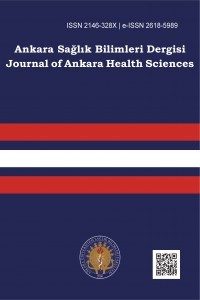Sağlık Kurumları Yöneticiliği Bölümü öğrencilerinin toplumsal cinsiyet rollerine ilişkin tutumları
Bu çalışma, Ankara Üniversitesi Sağlık Bilimleri Fakültesi Sağlık Kurumları Yöneticiliği Bölümü öğrencilerinin toplumsal cinsiyet rollerine ilişkin tutumlarını değerlendirmek amacıyla yapılmıştır. Araştırmanın evrenini, Sağlık Kurumları Yöneticiliği bölümü 1. ve 4. sınıfta öğrenim gören 139 öğrenci oluşturmuştur. Ulaşılabilir bir evren olması nedeniyle örnek seçilmeyip, öğrencilerin tümüne ulaşılması düşünülmüştür. Araştırma, tanımlayıcı türde olup, veriler anketle toplanmıştır. Verilerin toplanmasında Zeyneloğlu ve Terzioğlu tarafından geliştirilen “Toplumsal Cinsiyet Rolleri Tutum Ölçeği” kullanılmıştır. Anket, öğrencilere gözlem altında uygulanmıştır. Araştırmadan elde edilen veriler bilgisayara aktarılmış, uygun istatistiksel tekniklerle analiz edilmiş ve değerlendirilmiştir. Öğrencilerin toplumsal cinsiyet rolleri açısından genel olarak eşitlikçi tutuma sahip oldukları, ancak evlilikte cinsiyet rolü, geleneksel cinsiyet rolü ve erkek cinsiyet rolü açısından ise daha çok geleneksel tutuma sahip oldukları söylenebilir. Öğrencilerin çoğu (%86,3’ü) programda toplumsal cinsiyete ilişkin ders bulunması gerektiğini ifade etmişlerdir. Programa toplumsal cinsiyetle ilgili bir ders konması ve öğrencilerin konuya ilişkin bilgi paylaşımlarını sağlayan sosyal ve bilimsel etkinliklere yer verilmesi önerilebilir
Anahtar Kelimeler:
Toplumsal Cinsiyet, Tutum, Sağlık Kurumları Yöneticiliği Öğrencileri
THE ATTITUDE OF THE HEALTH INSTITUTIONS MANAGEMENT DEPARTMENT STUDENTS TOWARDS SOCIAL SEXUAL ROLES
This study has been prepared to evaluate the attitude of the Ankara University Faculty of Health Sciences Health Institutions Management Department students towards social sexual roles. The population of this research consisted of 139 students from 1st class to 4th class studying at the department of Health Institutions Management. As it is a reachable population, it has been planned to reach all students. The research is depictive and all data is collected through questionnaires. At collecting the data, “Attitude Scale for Social Sexual Roles” developed by Zeyneloğlu and Terzioğlu has been used. The questionnaire to students has been applied under observation. The data collected from the research have been transferred to computer, has been analyzed and evaluated through appropriate statistical techniques. It can be said that, students in regards of social sexual roles are egalitarian, however, sexual role in marriage, traditional sexual role and man sexual role, the students are more close to traditional approach. Most of the students (86,3 %) stated that there should be a lecture about the social sexual role in their program. Adding a lecture related with the social sex to the program and making social and scientific activities to let the students share knowledge about this subject can be adviced.
Keywords:
Social Sex, Attitude, Students of Health Institutions Management,
- ISSN: 2146-328X
- Yayın Aralığı: Yılda 2 Sayı
- Başlangıç: 2012
- Yayıncı: Ankara Üniversitesi
Sayıdaki Diğer Makaleler
Terapotik oyun: hasta çocuk ile iletişimin anahtarı
Berna KIRAN, Ceren ÇALIK, Figen İşık ESENAY
Sağlık hizmetlerinin kalitesini iyileştirmede bilgi sistemlerinin rolü
Sağlık Kurumları Yöneticiliği Bölümü öğrencilerinin toplumsal cinsiyet rollerine ilişkin tutumları
Ömer R. ÖNDER, Ayşe Saba YALÇIN, Bayram GÖKTAŞ
Cinsel Heyecan Arama Ölçeği (CHAÖ): Türkçeye uyarlama, geçerlik ve güvenirlik çalışması
Torakotomi sonrası ağrı ve analjezi yöntemlerinin kullanılmasında hemşirenin rolü
